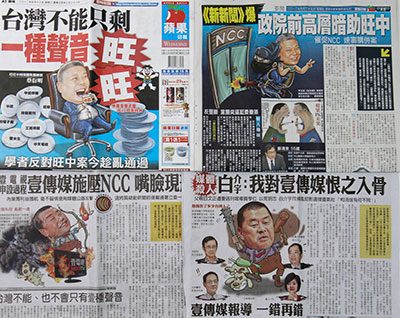A media buyout in Taiwan which would put independent news outlets critical of China into the hands of a pro-Beijing media tycoon is cause for concern for the island’s press. Jimmy Lai, the outspoken mogul behind Hong Kong-based Next Media and the Apple Daily tabloid, is selling his Taiwan holdings to a group of businessmen that includes Tsai Eng-meng, whose China Times Media group is supportive of China, according to local and international news reports.
• 中文 (pdf)
To understand why this is a problem, just scan media coverage of the deal: It is littered with casual references to the architecture of a healthy democracy. The sale is yet to be approved by regulators responsible for preventing monopolies, curbing financial institutions’ role in media, and limiting media investment from the mainland, according to The Associated Press. Under the deal, which has been restructured several times, profitable print assets would go to a consortium that includes Tsai as well as Jeffrey Koo Jr., the eldest son of Chinatrust Financial Holding’s chairman, and Wang Wen-yuan, chairman of Formosa Plastics, according to news reports; the unprofitable TV assets would go to another group that includes Koo and Wang but not Tsai. Most of the buyers have strong business ties with China, The Wall Street Journal reports. Unions representing the outlets’ employees have asked the new ownership to respect their editorial independence, according to the Taipei Times. The political opposition has spoken against the deal, while student groups led hundreds of protesters to lobby regulators and the legislature to reject the sale, the reports say. You can see photos on the Apple Daily Facebook page, because the international networking site long banned in China is available in Taiwan. Checks and balances? Check.
China, of course, not only lacks these elements, it actively censors and punishes expressions of political opposition. A measure of where Tsai Eng-meng stands on this issue can be taken from his remarks to a Washington Post reporter earlier this year regarding the 1989 crackdown on pro-democracy demonstrations in Tiananmen Square. He said accounts of Chinese security forces killing civilians were “overinflated,” according to the Post. (The exact death toll is not known, but its magnitude is disputed only in China, whose official count is below 300. Other estimates range from several hundred to thousands.) Coming from a media owner, this attitude is particularly troubling: The precise reason for the differing accounts of the events of the Beijing Spring is the rigorous media censorship that continues to this day. Questioned directly about the planned acquisition in a meeting with Apple Daily representatives, Tsai further concerned the media community by stating directly that journalists should consider the position of shareholders when reporting, according to the Taiwanese United Daily News, citing sources present for the discussion.
Taiwanese journalists are right to ask whether the existing regulations are enough to prevent the erosion of a free press under Tsai. The government’s National Communications Commission approved Tsai’s purchase of the second-largest cable TV provider earlier this year on condition he sell the cable TV news station he already owned, but he failed to comply, according to AP.
President Ma Ying-jeou–whose administration seeks closer ties with China–has said it would be “inappropriate” for the government to interfere in the evaluation of the sale by regulatory agencies. Yet if those agencies lack the strength to uphold the law, referring the question to them simply sidesteps responsibility for what happens next. Su Tseng-chang, who chairs the opposition Democratic Progressive Party, has accused Ma of worse, saying the Chinese Nationalist Party he leads has blocked legislative proposals for stricter agency review of the deal, the Taipei Times reported. Jimmy Lai has also said that regulators restricted his license and distribution rights to Taiwan’s principle cable systems for political reasons, causing the two-year consecutive loss which made the sale necessary in the first place.
Amid these pressures, regulators must hold firm. Rejecting the sale based on the many legal and ethical objections reported in local media would demonstrate their independence, and prove that Taiwan still has the safeguards to withstand influence from China. Letting it pass unchecked could mark the beginning of the end for Taiwan’s freewheeling media culture.
UPDATE: This post has been changed to reflect that the sale as currently structured involves two groups of buyers, only one of which includes Tsai. It has also been modified to state which of the assets are profitable and add detail about some of the additional buyers.
